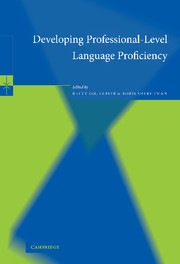Book contents
- Frontmatter
- Contents
- Notes on contributors
- Foreword
- Acknowledgments
- I Principles, practices, and theory
- II Programs
- 3 Contexts for advanced foreign language learning: a report on an immersion institute
- 4 Bridging the gap between language for general purposes and language for work: an intensive Superior-level language/skill course for teachers, translators, and interpreters
- 5 Learning Chinese in China: programs for developing Superior- to Distinguished-level Chinese language proficiency in China and Taiwan
- 6 Developing professional-level oral proficiency: the Shekhtman Method of Communicative teaching
- 7 The LangNet “Reading to the Four” Project: applied technology at higher levels of language learning
- 8 In the quest for the Level 4+ in Arabic: training Level 2–3 learners in independent reading
- 9 Teaching high-level writing skills in English at a Danish university
- 10 Heritage speakers as learners at the Superior level: differences and similarities between Spanish and Russian student populations
- 11 Teaching Russian language teachers in eight summer Institutes in Russian language and culture
- III Learners and users
- References
- Index
11 - Teaching Russian language teachers in eight summer Institutes in Russian language and culture
Published online by Cambridge University Press: 03 December 2009
- Frontmatter
- Contents
- Notes on contributors
- Foreword
- Acknowledgments
- I Principles, practices, and theory
- II Programs
- 3 Contexts for advanced foreign language learning: a report on an immersion institute
- 4 Bridging the gap between language for general purposes and language for work: an intensive Superior-level language/skill course for teachers, translators, and interpreters
- 5 Learning Chinese in China: programs for developing Superior- to Distinguished-level Chinese language proficiency in China and Taiwan
- 6 Developing professional-level oral proficiency: the Shekhtman Method of Communicative teaching
- 7 The LangNet “Reading to the Four” Project: applied technology at higher levels of language learning
- 8 In the quest for the Level 4+ in Arabic: training Level 2–3 learners in independent reading
- 9 Teaching high-level writing skills in English at a Danish university
- 10 Heritage speakers as learners at the Superior level: differences and similarities between Spanish and Russian student populations
- 11 Teaching Russian language teachers in eight summer Institutes in Russian language and culture
- III Learners and users
- References
- Index
Summary
Leaver and Shekhtman (this volume) state that in the USA “few students achieve Superior and Distinguished levels of proficiency in any foreign language.” Thompson (2000) finds in her sample of fourteen students that after five years of study 22% achieved Superior proficiency in speaking, 35.7% in reading, 14.3% in listening, and none in writing (pp. 264–271). Clearly, time on task alone is insufficient for reaching the Superior/Distinguished (SD) level. What is needed, as noted by many authors in this volume, is direct instruction, cultural experience through in-country study or work or its equivalent, and attention to the development of specific aspects of the components of communicative competence.
Since teachers are the product of this educational system, it is safe to assume (and our personal experience bears it out) that teachers of foreign languages do not themselves always possess SD-level proficiency. That, of course, raises the question: what proficiency is sufficient to teach a foreign language? The answer varies, depending on the level taught and the approach used. Some teachers would argue that they have been able to meet the needs of their students, even though they themselves have never exceeded the Advanced level of proficiency. Such teachers are probably teaching in a traditional program, focused on developing students' knowledge of the Russian linguistic system. For example, in the traditional organization of American university foreign language departments (especially languages other than Spanish and French), faculty have often been linguists with mostly theoretical knowledge of the language, rather than with well-developed oral and aural skills.
- Type
- Chapter
- Information
- Developing Professional-Level Language Proficiency , pp. 219 - 242Publisher: Cambridge University PressPrint publication year: 2002
- 2
- Cited by



